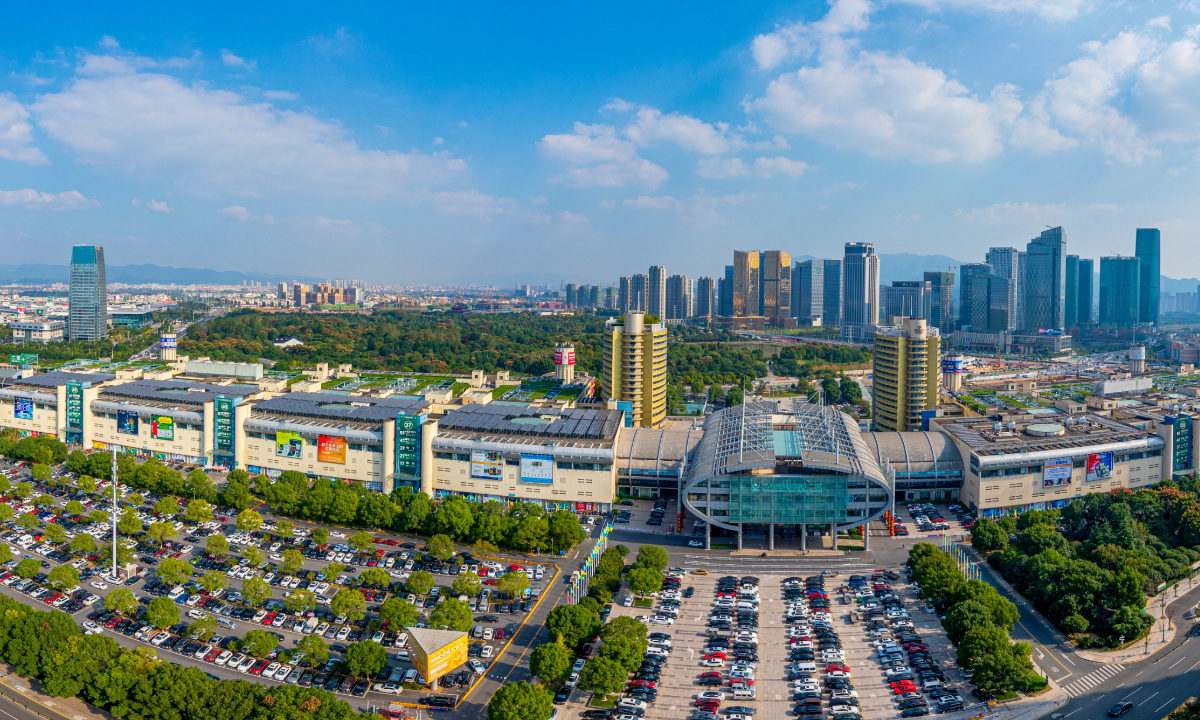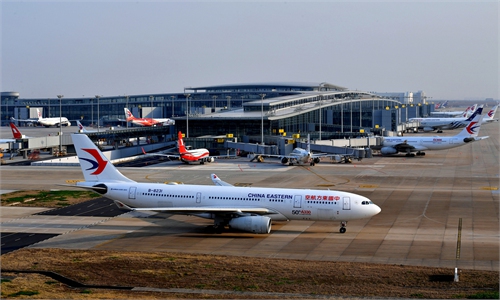Jiangsu and Zhejiang provinces pledge new efforts to stabilize foreign investment following overseas trips

An aerial view of the Yiwu International Trade Market in Yiwu, East China's Zhejiang Province Photo: VCG
As the world's second-largest economy has optimized its COVID-19 response and vowed stronger support for economic growth, many Chinese provinces and regions have sent trade delegations to Europe, striving to fortify business ties with their overseas peers.
With many of these foreign trade delegations returning with new contacts and investment intentions, local governments pledged new efforts to consolidate the results of overseas trips to boost foreign trade and investment.
Plan for 2023
Suzhou in East China's Jiangsu Province is making a full year of plan for overseas trips in 2023 and a performance list to check the results of the trips, Shanghai Securities News reported on Saturday.
"We are planning to gradually normalize overseas investment and establish a long-term mechanism for overseas investment and market expansion," an official from the foreign investment department under the Suzhou Bureau of Commerce said, adding that the city has made plans covering the whole of next year with focus on key investment projects and major foreign trade orders.
The city will also provide support and convenient services for visa applications and promote overseas resource sharing for trade delegations to carry out key overseas trade and investment projects, according to the official.
At the same time, Suzhou has also launched the "tour performance list" mechanism, which will track the results of investment attraction and market development achieved by the visiting groups and provide full process support and service during project landing and order delivery.
After completing a 9-day business tour to the Europe which secured investment commitments equal to 13 billion yuan ($1.86 billion), the city of Taicang, East China's Jiangsu Province will step up efforts to actively upgrade the level of cooperation with Germany and strive to build a national-level cooperation platform with Germany, according to local officials.
The Taicang High-tech Industrial Development Zone - located in the county-level city of Taicang - is home to a cluster of German enterprises, innovation, and industry-city integration.
The Global Times learned from local authorities that charter flights to Europe further consolidated and improved the level of economic and trade cooperation between the city of Taicang and European companies, especially German companies. It is conductive to getting more projects and orders, according to officials from the Taicang High-tech Industrial Development Zone.
During the trip, the business group from Taicang visited 14 cities, held four investment promotion meetings and visited more than 20 enterprises, associations and investment promotion agencies, including Dassault Systèmes, Airbus and Audi and received a highly positive response.
The visit resulted in a total investment commitments equal to 13 billion yuan, including a 3 billion yuan investment on new energy vehicle autonomous driving parts, 3 billion yuan investment on new energy vehicle electric drive project, 2 billion yuan investment on auto smart equipment project, 2 billion yuan investment on smart food production equipment project, 120 million euros ($127.4 million) investment of an upgraded new energy vehicle driving system and 500 million yuan investment on an logistics transportation equipment project, according to the Suzhou Bureau of Commerce.
Taicang is now home to more than 387 German companies and around 90 percent of them have successfully expanded their production capacity and many companies chose to set up their China headquarter, R&D center or sales center in Taicang, according to a report by the German Chambers of Commerce Abroad.
The visit to Europe has greatly boosted the confidence of European enterprises, especially German-funded enterprises, to deepen their investment and development in Taicang High-tech Industrial Development Zone, according to local officials.
Accelerated resumption of work encouraged
In East China's Zhejiang, delegations of foreign trade firms recently completed their recent tour to Germany and France, with a turnover of $32 million, the best performance ever.
This type of overseas visit has two significant outcomes: one is to win actual orders and the second is to enhance confidence. Such visit could boost confidence for domestic export enterprises, but also for overseas customers to strengthen their determination to place orders to China, Zhu Qiucheng, CEO of Ningbo New Oriental Electric Industrial Development, told the Global Times, who have recently completed an overseas business tour to Dubai.
"The actual effect of the visit has been inspiring. We have a community of export companies, and I have done some research, most of which are very promising," Zhu said, adding that he is looking at the growth opportunity for the Regional Comprehensive Economic Partnership region, Southeast Asian markets, and domestic trade market next year.
The next important task is to ensure these export-oriented enterprises can recover to their ideal production levels as soon as possible.
Many cities in Zhejiang Province have announced bonuses to encourage workers stay at their posts for the Spring Festival to facilitate the work resumption after the holiday season.
China will open its doors wider to foreign investment next year and improved epidemic prevention measures have created more positive factors for foreign investors to expand in China, Bai Ming, deputy director of the international market research institute at the Chinese Academy of International Trade and Economic Cooperation, told the Global Times.
"The easing COVID measures will make it easier for foreign investors to come to China for on-site inspection," Bai said. "This is a win-win situation. We need foreign technology to help relevant industries in China improve their status in the international division of labor, while foreign companies need to tap into the massive Chinese market," he said.
China's foreign trade grew 8.6 percent year-on-year in the first 11 months of 2022 despite mounting challenges such as weak overseas demand, growing geopolitical tensions and COVID-19 flare-ups.



